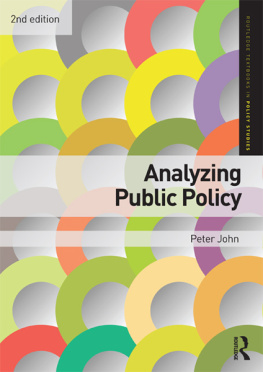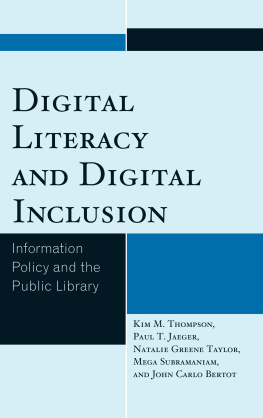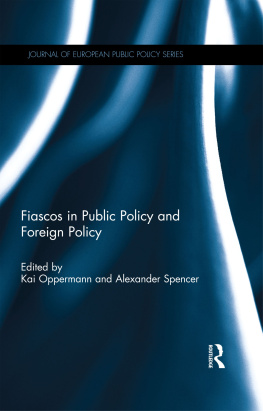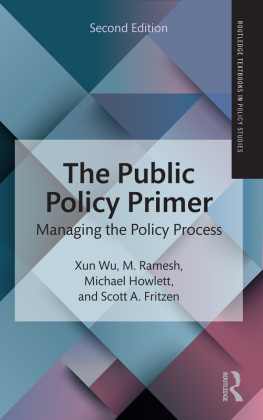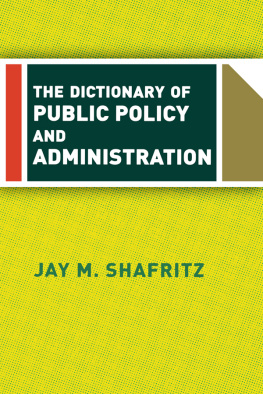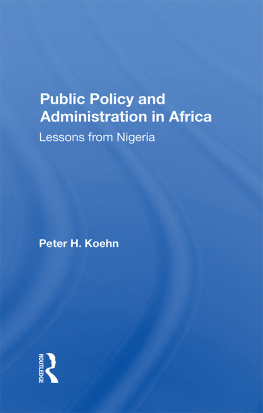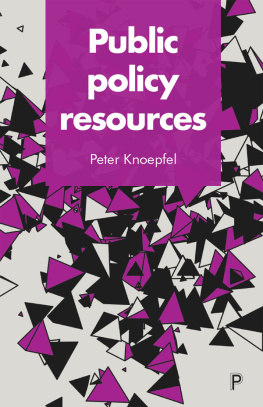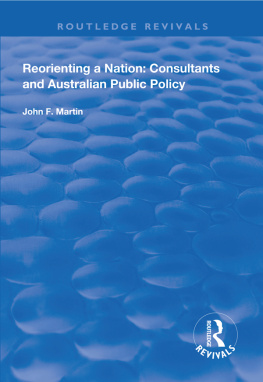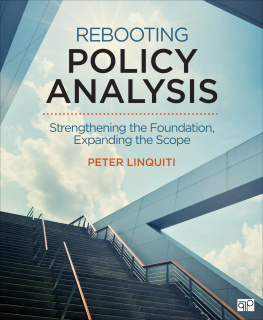Analyzing Public Policy
The fully revised and updated new edition of this textbook continues to provide the most accessible overview of the main approaches in the study of public policy. It seeks to review the most common and widely used frameworks in the study of policy analysis:
institutions
groups and networks
society and the economy
individual interests
ideas.
The book explains each one, offers constructive criticisms, and explores their claims in the light of a variety of American, British, and European examples.
Arguing that no one framework offers a comprehensive explanation of public policy, John suggests a synthesis based on different aspects of the approaches, introducing concepts and approaches of advocacy coalitions, punctuated equilibrium, and evolution as more effective ways to understand public policy.
Combining both a clear summary of debates in public policy and a new and original approach to the subject, this book remains essential reading for students of public policy and policy analysis.
Peter John is Professor of Political Science and Public Policy in the School of Public Policy at University College London.
Routledge Textbooks in Policy Studies
This series provides high-quality textbooks and teaching materials for upper-level courses on all aspects of public policy as well as policy analysis, design, practice, and evaluation. Each text is authored or edited by a leading scholar in the field and aims both to survey established areas and present the latest thinking on emerging topics.
The Public Policy Primer
Managing the policy process
Xun Wu, M. Ramesh, Michael Howlett, and Scott Fritzen
Designing Public Policies
Principles and instruments
Michael Howlett
Making Policy Work
Peter John
Analyzing Public Policy, 2nd Edition
Peter John
Analyzing Public Policy
Second edition
Peter John
First published 1998 by Continuum International Publishing Group
Second edition published 2012
by Routledge
2 Park Square, Milton Park, Abingdon, Oxon, OX14 4RN
Simultaneously published in the USA and Canada
by Routledge
711 Third Avenue, New York, NY 10017
Routledge is an imprint of the Taylor & Francis Group, an informa business
2012 Peter John
The right of Peter John to be identified as author of this work has been asserted by him in accordance with the Copyright, Designs, and Patents Act 1988.
All rights reserved. No part of this book may be reprinted or reproduced or utilized in any form or by any electronic, mechanical, or other means, now known or hereafter invented, including photocopying and recording, or in any information storage or retrieval system, without permission in writing from the publishers.
Trademark notice: Product or corporate names may be trademarks or registered trademarks, and are used only for identification and explanation without intent to infringe.
British Library Cataloguing in Publication Data
A catalogue record for this book is available from the British Library
Library of Congress Cataloging in Publication Data
John, Peter, 1960
[Analyzing public policy]
Analyzing public policy / Peter John.2nd ed.
p. cm. (Routledge textbooks in policy studies)
Previous ed. published as: Analysing public policy. London; New York : Pinter, 1998,
in series: Critical political studies (Pinter (Firm))
Includes bibliographical references and index.
1. Policy sciences. I. Title.
H97.J65 2012
320.6 dc23 2011029796
ISBN: 978-0-415-47626-3 (hbk)
ISBN: 978-0-415-47627-0 (pbk)
ISBN: 978-0-203-13621-8 (ebk)
Typeset in Times New Roman
by Cenveo Publisher Services
Contents
Preface and acknowledgments
to the second edition
My main debt of thanks goes to Craig Fowlie at Routledge. He first suggested at the International Political Science Association meeting in Quebec in 1999 that I write a second edition of Analyzing Public Policy. But it took a very long time for Continuum to release the rights, and then there were the usual obstacles that authors encounter when producing books. The impacts of these delays have been interesting, revealing much about the field and me. Back in 1996 and 1997 when I was writing the original book, scholars in public policy were racing ahead with new frameworks of punctuated equilibrium and policy advocacy coalitions. With such a momentum of change, there was a risk the field would have changed so much during the intervening period that I would have to conceive a new structure for the book. The surprise is that, bar the large expansion of interest in interpretative policy analysis, there have been relatively few innovations in the theory of public policy since 1998, or at least not as many as there were in early 1990s. So I have concluded that the current state of the field allows me to retain the original structure and logic. I have been able to present the main approaches to public policy in five core chapters before arguing for synthetic theories. Naturally I have rewritten quite of lot of the book, mainly updating the citations, introducing new debates, and downplaying some issues that seemed more important in 1998 than they do now. I have also sought to introduce more material from mainstream political science, for example, from comparative political economy and recent studies of Congress, showing more links between the study of public policy and wider research programs than I did before, partly so that I keep abreast of the fast-moving world of political science and partly to imply that public policy scholars should do the same. But it is satisfying that the core argument remains plausible while the book sums up the latest thinking.
The main change over the intervening years has been in my own experience and outlook. I have developed much more of an interest in research methods and design. As a result I have endeavored to do more rigorous research, for example, by using randomized controlled trials in the evaluation of public policies, and I do fewer case studies and interviews than I did before. So it felt odd coming back to a book I wrote with a different intellectual sensibility. I was tempted to rethink the overall intellectual framework and mode of reporting the research, but on reflection I considered that the structure and approach still works well, largely because it already presented an argument in favor of more analytical treatments of public policy.
I am also sympathetic to the likely readers of this book. I have had a lot of positive feedback from readers of the first edition, or at least the critics have mainly held back. The main reaction I got from students and others was that the book was clear, approachable, and pleasantly free of jargon. Even though some of the ideas and arguments are complex, the first edition was a genuine introduction to the field and one anyone could read with profit. I thought it would be a great shame if I spoiled this. In any case, Routledge has allowed me freedom to follow my current obsessions in my new book on the tools of government, Making Policy Work (2011), in which I argue for better research designs and randomized experiments.
One aspect of the first edition that did attract criticism was its application of evolutionary theory to public policy. I published a paper on local government taxation that drew on the book's arguments (John 1999). This attracted a critical commentary (McConnell 2000, Dowding 2000) to which I replied (John 2000). I also had a chance to develop my position in another paper (John 2003), in which I refined my ideas and reflected on how to apply them. For these reasons the evolutionary coda to this book is more cautious in its claims than before. But it remains there nonetheless.


